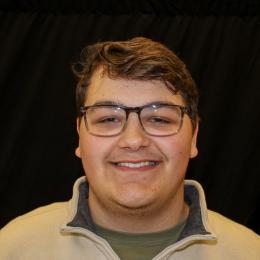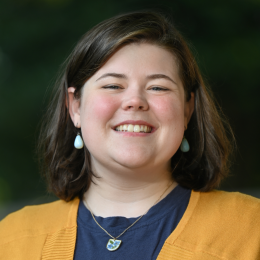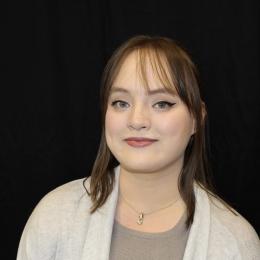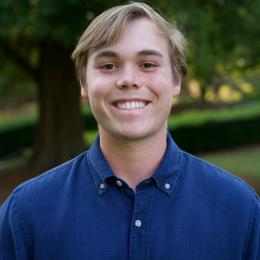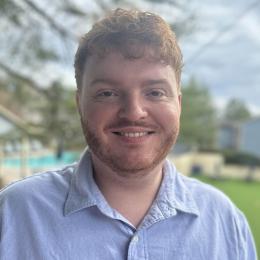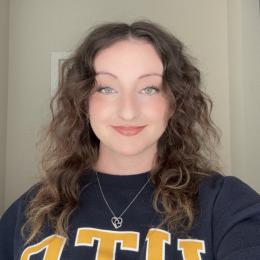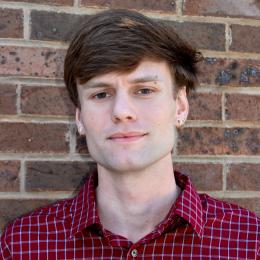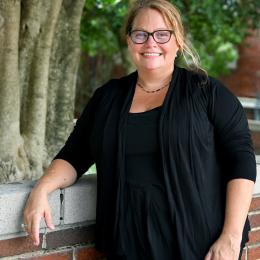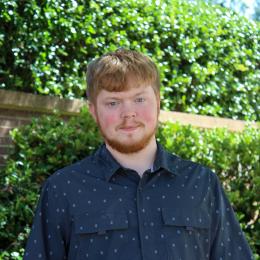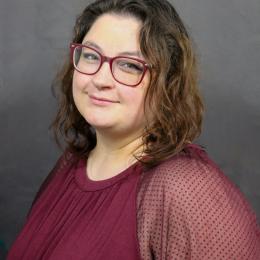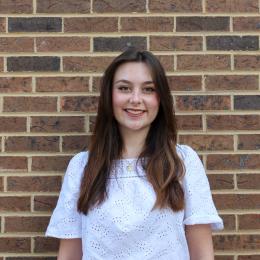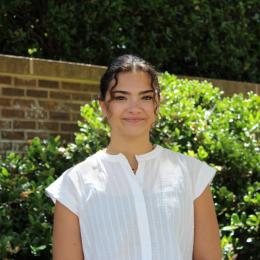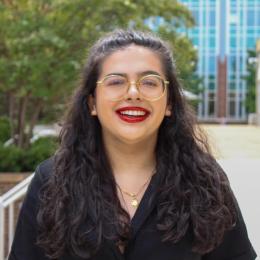Our Students
Curious what types of students join our Psychological Sciences MS Degree program? Check out the following bio summaries for our current students (2025-2026):
Second Year Students:
- Claire Beach
-
What are your research interests?
My research interests include executive function and the process of decision making, the connection between the brain and human behavior, and treatments for neurological dysfunction.
What are your career goals?
After obtaining a master’s degree in psychological science, I will pursue a PhD in the field of neuropsychology.
Why did you choose the UTC Psychological Science program?
I chose this program because of the outstanding faculty and student teaching opportunities. The broad range of skill development offered is useful for pursuing a PhD in the future. In addition to this, the mentorship model provides valuable feedback and support from successful cognitive scientists in the field.
- Cooper Mathis
-
What are your research interests?
In general I am interested in the intersection between cognitive, clinical and behavioral psychology. More specifically, I am interested in how clinical disorders affect cognition and how that cognitive dysfunction is manifested. I am particularly interested in mood and personality disorders.
What are your career goals?
My end goal is to obtain a PhD in clinical psychology and pursue either research in clinical settings or to become a clinician.
Why did you choose the UTC Psychological Science program?
What drew me to the UTC Psych Science program was the mix of research and teaching opportunities. This program has a heavy focus on research, which is something that I am interested in, but it also offers opportunities to explore teaching within psychology.
- Hannah Barger
-
What are your research interests?
My research interests so far in my journey have been interdisciplinary, but I’m most passionate about applied social psychology . I’m currently focusing on applying psychology to strengthen educational outcomes for students across UTC’s campus. For example, the most recent study I’ve directed focuses on student perceptions of the advising “onboarding” experience for undergraduate transfer students coming to UTC.
What are your career goals?
My current career goals are to use the skills and knowledge I learn from this program and apply them across campus. I currently work as an undergraduate Academic Advisor, and plan to use this degree to qualify for promotions here at UTC. This program also puts me in a particularly qualified position to provide evidence through research to support and promote policy change for the university.
Why did you choose the UTC Psychological Science program?
I chose the UTC Psych Science program for two reasons. First, this was a great location since I already work on campus (and Chattanooga’s a great city). More importantly, my psychology students would tell me how dedicated the psychology faculty were to student success. I couldn’t help but want to get involved with this program!
- Hannah Daughtery
-
What are your research interests?
My research interests revolve around understanding belief systems. Specifically, I am intrigued by how these systems are developed and maintained throughout a person’s lifetime and how they affect different areas of behavior and decision-making. Within this realm, I am fascinated by how these beliefs can go awry through polarization, extremism, or the influence of misinformation. Our beliefs impact every aspect of our lives, from interpersonal relationships to moral views to what products we buy. I aim to investigate the psychological mechanisms underlying belief-driven behaviors to gain a better understanding of how people construct and navigate complex social realities. My objective is to identify the moments when individuals are most receptive to revising or re-evaluating their beliefs, and how subtle social cues or interventions can promote adaptive changes in belief systems. Ultimately, I aspire to contribute to the development of strategies that ameliorate the myriad negative outcomes that stem from beliefs "gone bad," fostering a more empathetic and socially cohesive environment.
What are your career goals?
After completing my master’s degree, I plan to pursue a PhD to further specialize in social psychology and build a research-centered career. My long-term goal is to advance the understanding of belief systems and their impact on societal behavior through rigorous, high-impact studies. I am particularly focused on producing research that offers insights into complex psychological phenomena and addresses real-world issues. Ultimately, I aim to contribute to the field by developing evidence-based strategies that foster social cohesion and resilience against polarized beliefs.
Why did you choose the UTC Psychological Science program?
I chose the UTC Psychological Science program because of its strong emphasis on research and the mentorship model that aligns with my career goals. With my interest in studying belief systems and their social impact, UTC’s focus on developing critical evaluation skills and offering hands-on research experience will be invaluable in shaping my future research interests and fostering my ability to make meaningful contributions to the field. The program’s comprehensive approach to data analysis and ethical research practices also provides the foundation I need to advance toward a PhD and a research-centered career in social psychology.
- Izabella Leblanc
-
What are your research interests?
I have a broad interest in social psychology, with a continued interest in the intersection of psychology and law. My primary research interests are to understand how social influences—such as peer and familial relationships, and community dynamics—affect mental health and behavior among at-risk youth. I aim to explore social intervention programs for at-risk youth, with the goal of identifying methods that foster positive mental health outcomes. I’m also interested in research concerning the juvenile justice system and rehabilitation, as well as supporting victims of crime.
What are your career goals?
I would like to pursue my Ph.D. after graduating, either in social psychology or clinical psychology. Following my Ph.D. I would like to assist with and help develop community programs that support at-risk youth.
Why did you choose the UTC Psychological Science program?
I chose the UTC Psychological Science program because of its well-rounded faculty, who have niche research interests. I believe the program has faculty that caters most to my own interests and would provide me with a robust education to prepare me for my future career.
- Luke Hicks
-
What are your research interests?
Broadly, my research interests center around clinical and cognitive psychology. Specifically, I have interest in empowerment strategies and positive clinical outcomes related to the autistic community. The focus of my thesis project is to determine techniques of goal attainment among neurodivergent individuals related to social and self-perception. Additionally, I am currently working on projects concentrated on developing a scale related to resilience to trauma for children. I also have special interest in applied qualitative methodology in understanding theory of mind among marginalized adolescent and child populations.
What are your career goals?
After completing this program, I hope to pursue a doctorate degree in clinical psychology. My ambition is to become a licensed clinical child psychologist specializing in work with autistic or disadvantaged groups. My passion for a psychological career originates from the paucity of childhood mental health interventions in the Southeast.
Why did you choose the UTC Psychological Science program?
I chose UTC’s psychological science program because of the genuine nature of the faculty and the welcoming environment they cultivate. This program also offers a unique experience to work with specific faculty members and learn from their expertise. I believe the mentor modeling in this program creates a structure that fosters immense growth in key skills in psychological research. Also, I love being outside and Chattanooga has countless opportunities to hike, fish, and bike.
- William Moore
-
What are your research interests?
I am interested in deepening our understanding of how mental health issues manifest within the body.
What are your career goals?
My goal is to complete a Ph.D. in clinical psychology. My dream is to work in clinical practice while also conducting research, ideally in an academic setting.
Why did you choose the UTC Psychological Science program?
I chose the UTC Psychological Science M.S. program for the opportunity to collaborate with enthusiastic and knowledgeable mentors. I had also heard positive feedback about the cohort model, and the idea of having a supportive group of peers sounded like a great thing to be involved in!
- Samantha Dean
-
What are your research interests?
My research interests are broad, encompassing clinical, cognitive, and social psychology. I am particularly intrigued by developmental issues, cognitive processes, and aspects of social psychology such as personality and emotions. I look forward to exploring these areas further to refine my focus.
What are your career goals?
My primary career goal is to pursue a PhD in psychology, with a broad interest in areas such as clinical, cognitive, and social psychology. I am excited to explore these diverse fields through the UTC Psychological Science program, which I believe will help me identify my specific passions and strengths. Ultimately, I aim to contribute to the field through research and practice, making a meaningful impact on individuals and communities.
Why did you choose the UTC Psychological Science program?
I chose the UTC Psychological Science program because of its strong emphasis on research and practical application. The faculty's expertise and the program's focus on hands-on experience align well with my career goals in psychology. Additionally, the supportive academic environment and the opportunity to engage with diverse communities attracted me to UTC, making it an ideal place for my studies.
- Taylor Claxton
-
What are your research interests?
My current research interests primarily entail social psychology. Specifically, I am interested in intimate partner abuse, perceptions of traumatic events, social inequalities, and intersectionality. Through research, I aim to understand risk factors and inform effective prevention and intervention strategies to improve well-being.
What are your career goals?
My goal is to become a social psychologist and conduct research to address real-world problems and improve individuals’ well-being. I am considering pursuing a PhD after completing the Psychological Science program. However, I am also open to working in the applied research sector after graduating.
Why did you choose the UTC Psychological Science program?
I chose the UTC Psychological Science program based on my undergraduate experience at UTC, during which the psychology department faculty consistently provided me with opportunities and guidance necessary for my academic and professional development. Additionally, my prior experience on the editorial board for the Modern Psychological Studies journal and the opportunity to serve as Editor-in-Chief played a significant part in my decision.
- Taylor Lange
What are your research interests?
My research interests focus on the intersection of community psychology, sociology, and political science, with a particular emphasis on understanding how disparate economic and social macrosystems perpetuate structural violence and contribute to injustice and inequity experienced by historically marginalized populations. My goal through research is to contribute to the dismantling of systemic oppression by creating and expanding social theories that can ultimately drive social and political policy changes towards genuine equity and justice.
What are your career goals?
Following my graduation from UTC’s Psychological Science program, I plan to pursue doctoral studies to further my research on structural violence and systemic oppression. My long-term goal is to work for a think tank, such as the Urban Institute, where I can contribute to economic and social policy research that promotes impactful policy recommendations. Additionally, I aspire to continue engaging in academia, teaching, and mentoring the next generation of thought leaders who are committed to driving meaningful social change.
Why did you choose the UTC Psychological Science program?
I chose UTC’s Psychological Science program because of its strong emphasis on research and the opportunity to work closely with faculty who are leaders in academia and innovation. The program’s mentorship model provides invaluable individualized guidance as I cultivate my own research interests and shape the next phase of my academic and professional journey. UTC’s robust connections to the Chattanooga community provides an incredible opportunity for experiential learning to apply my skills and knowledge in ways that are meaningful to me and reflect my career goals.
First Year Students:
- Amy Brown
-
What are your research interests?
My research interests primarily focus on understanding the experiences of atypical neurodivergent students in college classrooms. I am interested in examining cognitive processes in students with autism spectrum disorder, ADHD, dyslexia, and other learning differences in order to develop strategies that best support their academic success. Most college classrooms are structured with typical learners in mind, which can create barriers for neurodivergent students. By combining performance-based assessments with self-report and functional questionnaires, I want to explore evidence-based inclusive teaching practices that address these challenges and promote more inclusive learning environments.
What are your career goals?
My career goal is to become a college professor in psychology. Whether in a community college or as a university lecturer, my goal is to teach and influence students. I hope to create a classroom that is accessible and inclusive for students with diverse learning needs.
Why did you choose the UTC Psychological Science program?
I chose to pursue my master’s degree in Psychological Science at UTC because of the amazing faculty I had the privilege of learning from during my undergraduate studies in psychology. I wanted to continue my education in a mentor-based program that emphasizes both teaching and research. This program offers the opportunity to learn directly from experienced professors in the field while also gaining hands-on experience teaching psychology in university classrooms. In addition, the program provides coursework focused on effective teaching methods as well as opportunities to explore topics of personal research interest.
- Brady Permenter
-
What are your research interests?
My research interests center on the cognitive mechanisms underlying human decision-making. I also have an emerging interest in Artificial Intelligence and how individuals interact with that emerging technology. My current research focuses on when and how individuals judge an AI to be trustworthy and utilizes electroencephalography (EEG).
What are your career goals?
After graduating from UTC, I intend to pursue my Ph.D. in Cognitive Psychology. I hope to establish myself as a research scientist and help develop a greater understanding of the highest and most complex levels of human cognition.
Why did you choose the UTC Psychological Science program?
I was drawn to UTC’s program because of its heavy emphasis on experiential learning. I am grateful for the opportunity to gain hands-on experience in the lab setting and develop my skills as a researcher under the mentorship of world-class faculty.
- Chloe Wilson
-
What are your research interests?
My primary research interests include prejudice, bias, social influence, intergroup relations, and social perception. I find that it is important that we understand why people behave the way they do, how society/societal expectations influence these behaviors, and how specific behaviors may be reduced or eliminated.
What are your career goals?I intend to pursue a doctoral degree in Social Psychology. After obtaining my Ph.D., my goal is to enter academia where I can foster aspiring psychologists while also continuing to conduct research.
Why did you choose the UTC Psychological Science program?I chose the UTC Psychological Science program because I had heard wonderful things about the program from other students who attended my undergraduate school (UNG) along with having research interests that aligned with some of the faculty at UTC. In addition to this, the program itself seemed to hit all the marks and offer the opportunities I needed to grow myself as a researcher but also to help me develop my teaching abilities.
- Daniel Selsvik
-
What are your research interests?
My research interests integrate affective, behavioral, and social neuroscience with clinical neuropsychology and rehabilitation psychology. I am particularly interested in examining neural activity markers of emotion, attention, and motivation processing using electroencephalography (EEG). Within EEG, I plan to use both event-related potentials (ERPs) and frequency analysis to identify these markers and better understand how they relate to both individual and social neural processes. I aim to apply these approaches to both normative affective functioning and clinical challenges such as substance use, mood disorders, concussions in college athletes, neurodivergence among college students, and acquired brain injuries. Ultimately, I hope to advance understanding of how the brain supports emotional and cognitive health in ways that can inform more effective treatment and rehabilitation strategies.
What are your career goals?
Following my education at UTC, I intend to pursue a Ph.D. in Clinical Psychology with a specialization in Neuropsychology. My goal is to establish myself as a scientist-practitioner, working at the intersection of research and clinical practice. I plan to work in inpatient and outpatient rehabilitation settings as a Clinical Neuropsychologist, where I will assess cognitive and emotional functioning, develop treatment plans, and deliver interventions that support recovery after neurological injury and improve adjustment for those living with neurological conditions or illnesses. I ultimately seek to advance neurorehabilitation treatments and broader rehabilitation systems to provide more effective, personalized, and sustainable care that improves recovery and long-term quality of life for individuals with neurological conditions, illnesses, and injuries.
Why did you choose the UTC Psychological Science program?
I chose the UTC Psychological Science program because it offers rigorous training in research methodology and psychophysiological techniques, particularly EEG, that align directly with my academic and career goals. This program not only provides advanced methodological training but also provides mentorship that supports students in pursuing their interests, developing independent lines of inquiry, and preparing for doctoral study. UTC’s supportive yet challenging environment also fosters growth as both a researcher and future clinician, making it the perfect place for me to continue developing the skills needed for my future career.
- Gracen Landry
-
What are your research interests?
My research interests are forensic-focused. Specifically, I am interested in psychological assessment in forensic contexts, how life experiences and personality traits contribute to criminal behavior, and the physiological processes behind violence and criminality. I want to improve upon the understanding of justice-involved individuals beyond their criminal actions. Criminal perpetrators are often defined solely by their offenses. I hope that learning how to truly understand them as people could enable me to mitigate some of this neglect.
What are your career goals?
After I graduate from UTC, I intend to receive further education at a Clinical Psychology doctoral program, after which I hope to pursue further forensic experience in a postdoctoral fellowship. Upon licensure, I would work as a forensic psychologist in a clinical forensic setting, such as a mental health hospital. I hope to provide evaluations and assessments, specifically for competency, insanity, and other legal matters.
Why did you choose the UTC Psychological Science program?
I chose this program due to two main factors: the close-knit community of the UTC psychology staff and students as well as the location. Chattanooga is my hometown, and after being out of state for undergrad, moving back to the city that I love and being near to my friends and family was one of the best decisions I have ever made. The people here at UTC are extremely supportive and challenge us to be the best scientists we could be.
- Isabella Charnley
-
What are your research interests?My research interests lie primarily in the field of neuropsychology, with a focus on memory, aging, and cognitive functioning. I’m particularly passionate about working with geriatric populations and exploring ways to support healthy cognitive aging. At UTC, I plan to take full advantage of the university’s resources to research memory and cognitive reserve that contribute to the prevention and understanding of dementia and Alzheimer’s disease.
What are your career goals?
My ultimate goal is to become a clinical neuropsychologist specializing in dementia care. I aim to deepen my understanding of cognitive processes and neuropsychological disorders through continued education in a doctoral program. I’m especially drawn to working one-on-one with clients, combining clinical practice with research to advance preventative care and improve quality of life for individuals affected by dementia.
Why did you choose the UTC Psychological Science program?
I chose UTC because the program aligns closely with my academic and professional goals. The faculty are incredibly supportive and foster an environment where students are encouraged to pursue their unique interests. I appreciate the cohort model, which creates a strong sense of community and collaboration. The program’s emphasis on individualized mentorship and research opportunities has made UTC the ideal place for me to grow as both a scholar and a future clinician.
- Kate Graphos
-
What are your research interests?In undergrad, I studied the effects of different over-the-counter medications on rats’ spatial memory and activity levels. I am very excited to continue my research with human participants, as I am interested in studying people’s spatial memory under different conditions. Possibly utilizing virtual reality to construct a Morris Water Maze, I could somewhat replicate my study with rats to see how humans differ.
What are your career goals?
Currently, I do not have any definite career goals. I plan to use my time at UTC to discover exactly what career path would best fit me and my passion for psychology. I know I would like to continue on the research path to hopefully contribute meaningful new research to the betterment of understanding human cognition.
Why did you choose the UTC Psychological Science program?
I chose the UTC Psychological Sciences program because of the unique opportunity graduate students have to work closely with faculty researching similar topics to our interests. I deeply value this chance to assist in a real psychological lab setting and gain hands-on experience in professional research. I was also drawn to work, research, and learn alongside a small but passionate cohort that provides the opportunity for life-long friendships and future professional relationships. I also love the Chattanooga area and am excited to explore here for at least the next two years!
- Maya Saxe
-
What are your research interests?I have fairly diverse research interests, but the overarching goal of my projects has been to create a body of work that could directly benefit my community. Specifically, I am particularly passionate about building, delivering, and assessing sexual violence prevention trainings for all ages and genders. I am also interested in intervention research for PTSD and schizophrenia, improving higher-education persistence among underrepresented groups, and more recently, the socio-environmental stressors that can exacerbate mental health challenges.
What are your career goals?
Following my masters’ at UTC, I am planning to get a Ph.D. in clinical psychology and practice in an acute psychiatric hospital setting. Originally, I had considered getting an MD and becoming a psychiatrist, but the combination of being able to provide assessment and talk therapy services was ultimately more attractive to me. I enjoy working with clients of all ages, and getting my masters’ at UTC will be my first step towards learning how to serve my future patients most effectively.
Why did you choose the UTC Psychological Science program?
UTC’s commitment to its students stood out to me in my masters’ program search. The small cohort model we have here ensures that all of us are given individualized attention and career assistance at any point we may need. I also appreciated how UTC emphasizes gaining research experience. My undergraduate degree is not in psychology, so personally, I knew that I needed to choose a program that would help me further those psychology research skills. Last, but definitely not least, I was privileged to work with the faculty mentor of my choice (Dr. Ruth Walker).

